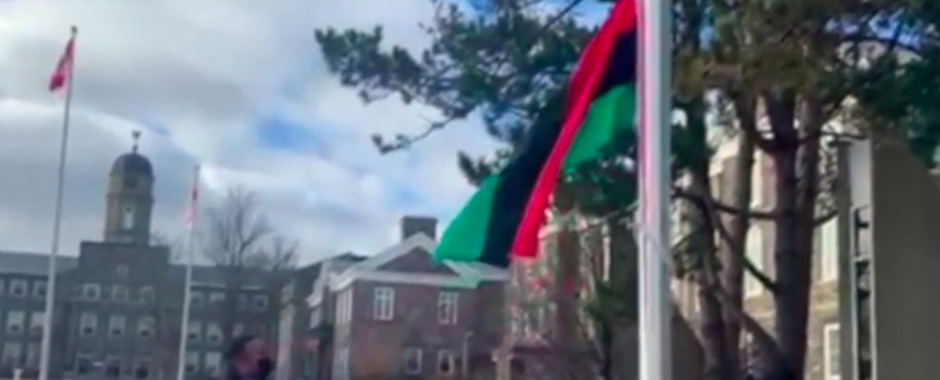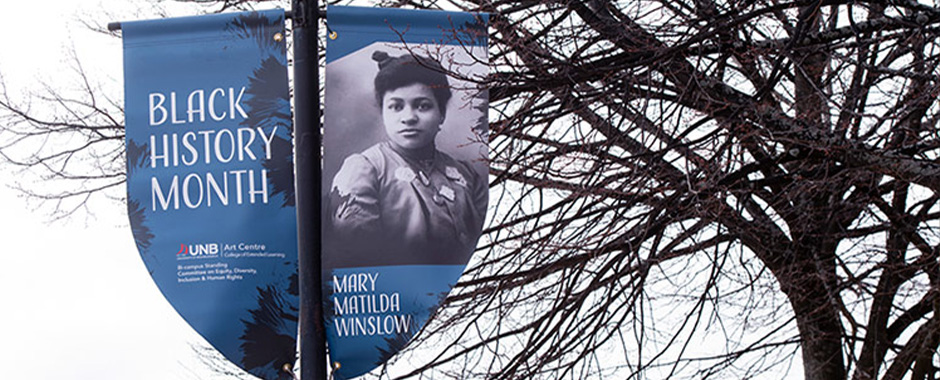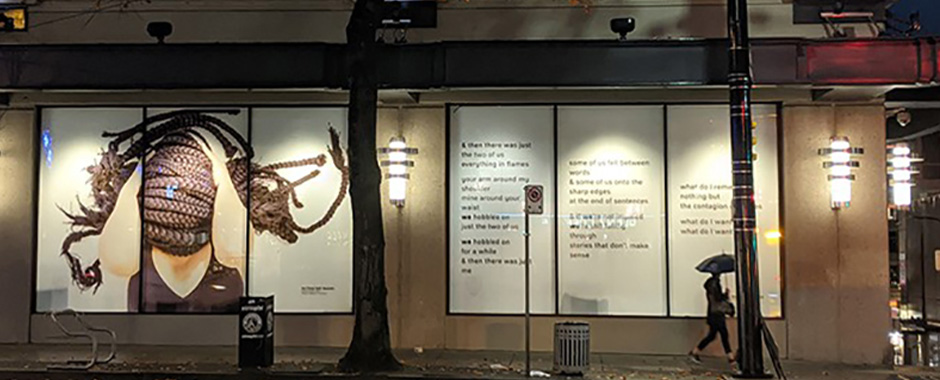Eduvation Blog
Wednesday, February 3, 2021 | Category: Eduvation Insider
White Privilege, Black History, and CdnPSE

Good morning!
Today our thoughts are with colleagues at Laurentian U in a year of great uncertainty, and also with everyone in Atlantic Canada, where institutions across NB, NS, PEI and NL shuttered their campuses yesterday against a significant winter storm. I hope you’re all safe and warm!
But across North America, higher education’s attention is also focused on Black History Month. Today I’ll do my best to do justice to the range of activities, gestures and actions being undertaken in CdnPSE this month to address racism and encourage equity, diversity and inclusion…
Postscripts
Yesterday I shared the disturbing news that Laurentian U had filed for creditor protection, and explained in detail some of the implications, and early warning signs over the past year. A bit more detail has since become public…

LU Couldn’t Make Payroll
According to its CCAA filing, Laurentian U “couldn’t meet payroll obligations for February.” An unnamed source told the Toronto Star that the province offered a $12M lifeline to cover payroll for Feb and Mar, but the University allegedly insisted that “heading to court was the only option.” The Faculty Association claims the administration’s past financial practices have been “poorly considered and reckless,” and lacking in transparency. OCUFA and CFS-O are urging the government to provide more long-term funding. Last week, Colleges and Universities Minister Ross Romano said he was “working with our colleagues across government, and certainly with our institutions” to determine where best to use “ultimately limited resources to try and remedy [COVID19 losses] the best we can.” He made it clear, however, that he was not talking about financial issues that “quite frankly pre-date COVID.” Toronto Star
UOF President Resigns
I mentioned last week that Université de l’Ontario Français, the new francophone institution slated to open in Toronto in Sept 2021, had received just 39 applications, although it planned to open with 200 students. (By Friday that had risen to 47, with just 2 first-choice applicants. The Canadian Taxpayers Federation objected that UOF would spend $400,000 of taxpayers’ money for each student this year.) Yesterday, the Board of Governors announced the resignation of UOF President André Roy “for personal reasons.” They added, “We recognize Mr. Roy’s significant contributions and efforts and wish him the best of success in the future.” The executive leadership of UOF will be temporarily reorganized, with 2 VPs sharing the responsibilities of interim leadership of the university. The first cohort of students is expected to arrive in “only a few weeks,” and “efforts are intensifying to recruit students from French-language secondary schools in Ontario as well as from francophone communities across Canada, including Quebec, and abroad.” Education News Canada
Cases on Campus
Since Monday, I have added 4 more COVID19 cases associated with CdnPSE. (Many cases go unreported, but see my master spreadsheet for a running tally.)
Durham College reported another case on its Oshawa campus on Monday. DC
uGuelph reports that the outbreak in residence ultimately involved 64 cases (3 more than I previously reported), but that 53 are now resolved, and the 200 students required to isolate are now down to 100. “We are moving in the right direction.” So far, 12 provincial fines of $880 each have been laid, and further university penalties, potentially including eviction, are still to come. Global
Bad Behaviour at UBC
I’m sure it’s merely a coincidence that both stories to go national are from the same institution…
Partying at Wreck Beach
The UBC detachment of the RCMP is investigating complaints about large night-time gatherings of students at the “clothing-optional” Wreck Beach, which sits just below a cluster of student residences on campus. (OK, I doubt even students are opting for clothing optional in mid-February.) “We’re not sure about the numbers and we are meeting to get more information.” Vancouver Sun
Legal “Vigilantes” at UBC
UBC’s Allard School of Law has a convoluted COVID19 situation on its hands. (I’m not sure whose behaviour is worse.) 2L students were apparently violating COVID19 health orders and protocols. (Bad.) 1L students then “created a spreadsheet of alleged peer non-compliance” gathered from social media profiles. (Good?) Apparently to share it with employers during recruitment. (Clever, but evil.) The Faculty’s Career Services office then chastised the 1Ls for “public shaming” and crossing “both ethical and professional boundaries” and “arguably” violating UBC’s Student Code of Conduct. (Unfair? Overly litigious? I guess, what can you expect with this many lawyers involved…) Daily Hive
#BlackHistoryMonth
Last week, higher ed social media feeds were jammed with messages about mental wellness, and at least in Canada, about #BellLetsTalk day. This week, North American higher ed is focusing on another aspect of EDI with the beginning of Black History Month (officially recognized in Canada since 1995, although celebrated since 1950 – and Nova Scotia traces African Heritage Month back to 1926). Clearly it remains important to address anti-Black racism, when a presidential commission can attempt to whitewash history, and just yesterday a 9-year-old girl was handcuffed and pepper-sprayed by police in Rochester NY.
Here’s a sampling of hundreds of examples that have flooded my social media feeds in the past week…

Symbolic Gestures
Obviously social media lends itself to memes and logos for BHM, but CdnPSE is doing more. Dalhousie U kicked off the start of African Heritage Month by virtually raising the Pan-African flag in a ceremony with speakers and drummers.
Speakers and Lectures
Algoma U is hosting a number of functions this month, including a keynote on Feb 17 by SUNY prof Cecil Foster, author of They Call Me George: The Untold Story of Black Train Porters and the Birth of Modern Canada. Emily Carr U is hosting an online conversation with A.Y. Odedeyi, “Black Studies, Black Struggle In & Beyond the University,” on Feb 24. uToronto is hosting online events “ranging from a discussion of Afrofuturism and the world-building of Wakanda to U of T’s marquee Black History Month Luncheon, which is celebrating its 19th year.”
YouTube Videos
I’ve collected a YouTube playlist of about a dozen BHM vids (so far). Aside from the lectures and panels, the 3-min vid from SFU Athletics is worth checking out. (Student athletes reflect on what BHM means to them.) Texas Tech has a decently-produced 1-min “commercial” for BHM.
Virtual BHM Events
York U is holding innumerable virtual events this month, from student-led trivia, cooking and dance workshops to #CelebrateWhileWeEducate, to weekly Understanding Racism workshops, and panel discussions by alumni. uAlberta’s Black Students’ Association and Black Medical Students’ Association are hosting an “Afro-Fusion Dance Workshop” and a “Jerk & Jollof” cooking tutorial on Zoom. Seneca College BHM activities include “Language Exchanges” in Swahili, Amharic, and Patwa.
Virtual Movie Nights
There are too many of these to list, but uAlberta’s Nigerian Students’ Association is hosting a Netflix watch party on Discord for “Malcolm and Marie.” UNB-Saint John is screening “I Am Not Your Negro,” a “radical narration about race in America” featuring narration by Samuel L Jackson. Laurentian U is encouraging its community to watch a short documentary by alumnus Isak Vaillancourt called “Amplify,” about 3 Black women from Sudbury. uToronto is holding a screening of Mina Shum’s documentary “Ninth Floor,” about a 14-day sit-in by 200 students in 1969 at what is now Concordia U, “a watershed moment in Canadian race relations.”

Celebrating Individuals
UNB’s Art Centre and EDI committee has produced banners and posterboards for display in Fredericton and Saint John, “featuring the stories of 28 Black New Brunswickers who made meaningful contributions to the province.” Bow Valley College is celebrating faculty, staff and students on social media for BHM, such as Learner Success Advisor Amanda Okafor. McGill U is profiling experts for media interviews. Lethbridge College’s online BHM celebrations “will focus on sharing the stories of the Black communities and will highlight issues of equality, diversity and inclusion.” uWindsor Daily News plans a series of stories this month featuring students, staff, faculty and alumni, like anti-slavery activist Mary Ann Shadd Cary. (A bronze statue of Shadd will be unveiled at uWindsor later this year.)
“Racial stereotypes were once used to justify chattel slavery… [and] continue to be used today to defend the disproportionate representation of Blacks in prisons in the US, Canada, and the UK, as well as their deadly encounters with law enforcement. Racism still exists, and more so alive in our criminal justice system and other institutions, including educational and health institutions.” – Ibrahim Turay, Justice Studies instructor, Lethbridge College

Art Installations
Simon Fraser U unveiled a street-facing art and poetry installation at its downtown Vancouver campus, in tribute to Breonna Taylor and Black womanhood. OCAD U’s Blxck Student Association is organizing a month-long program of artist spotlights, music, wellness sessions, film screenings and panel discussions, with all of the details on a microsite, www.blackOCADu.ca. (The microsite also showcases OCAD’s “Black cluster hire” of 5 new permanent faculty.)
Resources
No doubt academic libraries across the country have prepared reference guides or collections of materials in recognition of BHM. uGuelph’s McLaughlin Library is featuring an online collection, “Celebrating Black Narratives,” developed with the Cultural Diversity Office and the Guelph Black Students’ Association. On Feb 1, Black Lives Matter Fredericton launched a new teaching resource developed with the UNB Faculty of Education and St Thomas U, a database of curricula, lesson plans, stories, videos and resources “to bring Black histories into New Brunswick’s public schools.”
“We need to teach the real history of New Brunswick, including the fact that slavery and segregation were alive here for centuries, and the resistance and grit of the Black population.”– Husoni Raymond, Black Lives Matter Fredericton
Scholarships
McMaster U’s departments of History and of Communication Studies & Multimedia have created new bursaries for up to $2,500 per year, available for Black students based on financial need. “We knew we wanted to do something that went beyond just words.” McMaster U also announced a new $2,500 scholarship for first-year Black engineering students, “likely the first of its kind in Canada,” created with the Mac chapter of the National Society of Black Engineers. (You can contribute to the crowdfunding campaign here.) And uOttawa’s Faculty of Law has launched new $20,000 scholarships for up to 5 entering Black law students each year. And finally, 5 Ontario universities (McMaster, uWaterloo, uOttawa, uToronto, Queen’s and Western U) have partnered to establish new $100,000 Indigenous and Black Engineering and Technology (IBET) Momentum Fellowships for doctoral and specialized engineering researchers.
“This is a milestone, but one scholarship is not enough. [We need to] make sure the student (recipient) thrives and becomes part of our fireball family.” – Ishwar Puri, Dean of Engineering, McMaster U
Advice for White People
If, like me, you feel unqualified by your skin colour to address issues of Black culture or racism, here are a few words of encouragement…
York U’s Centre for Human Rights, Equity and Inclusion suggests that we “stop trying to make sure people know you aren’t a racist,” consider how your actions and words could make Black or Indigenous colleagues uncomfortable, and “call out your white colleagues or classmates,” but “don’t single out your Black or Indigenous people to speak for their entire groups.” They also recommend…
Ohio State prof Jasmine Roberts writes that it is overwhelming for her to respond to White colleagues “struggling with what to say or do” in the wake of the White Supremacist insurrection at the US Capitol in Washington DC. She provides a list of 10 suggestions as a starting point, from taking 3 hours to “read and truly engage with relevant work,” do the work ourselves to become anti-racist, and “avoid getting defensive.” (She provides lists of podcasts, books, and TEDx talks as a starting point.) We can diversify our curriculum, “stop blaming textbooks,” and collaborate with Black scholars. We need to “acknowledge the role higher education institutions play in maintaining systemic racism,” promote more Black people to academic leadership positions, and “provide space, unique support, and culturally-relevant/responsive resources for Black students, faculty and staff.”
“Yet this moment we’re witnessing across the country is not about White feelings. It is about the constant trauma, historic pain, and dehumanization that Black people experience, and frankly, have been experiencing long before the deaths of Breonna Taylor, George Floyd, and Ahmaud Arbery.” – Jasmine Roberts, Communications prof, Ohio State U
And hopefully it goes without saying, but this should be a lifelong effort, not something that ends on March 1!
“The celebrations and acknowledgement of the contributions of Black people to Canadian and Quebec history must go beyond Black History Month, as Black history is part of the Canadian and Quebec history – not a thing apart.” – Myrna Lashley, Psychiatry prof, McGill U
As always, thanks for reading. Stay safe and be well!

All contents copyright © 2014 Eduvation Inc. All rights reserved.